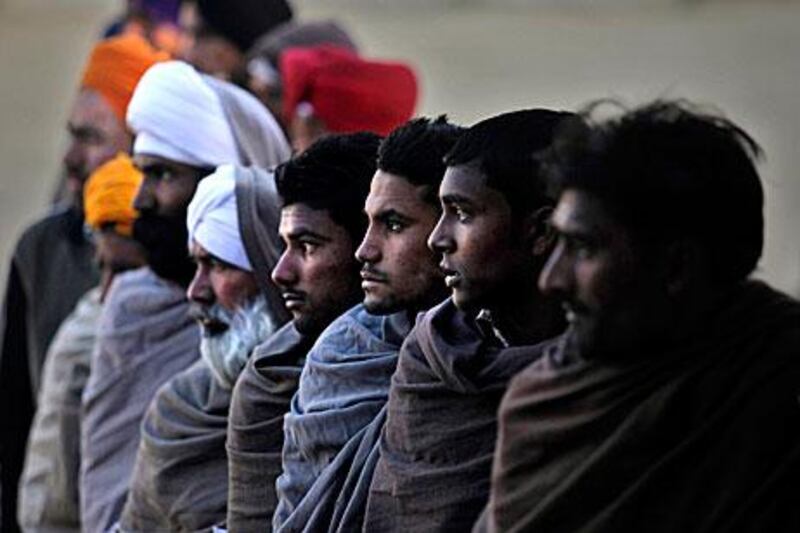NEW DELHI // Millions of Indians voted in two key election states of Punjab and Uttarakhand yesterday. The country's ruling Congress party in both states faces a crucial battle against its main opposition political rival, the Bharatiya Janata Party (BJP) and its allies. The BJP controls both states but its reputation has been battered by allegations of corruption.
The Congress party has not fared any better. The ruling party's reputation, which has cast a shadow on the states as well, is marred by corruption, a slowing economy and a gridlocked parliament that has been unable to pass key legislation.
Both parties have been under attack from a populist anti-corruption movement.
Five of 28 Indian states are going to the polls by early March. A win in all five states will boost the power of the Congress party, which has faced increasing opposition on legislation, even from its allies.
"Congress is a big stakeholder in Punjab. Uttarakhand matters a lot too. Who comes to power in these states will make a difference on the national level," said Rasheed Kidwai, the author of 24 Akbar Road, a book about the national Congress politics.
More than 20 million people were eligible to vote yesterday, with 1,800 candidates contesting 187 assembly seats in the two states.
In Uttarakhand, which borders China and Nepal, voting for the state's 70 openings started slowly because of the cold weather but turnout improved as the day warmed up. The BJP is fighting to gain a second term in power, struggling to cope with allegations of corruption against the state's former chief minister.
Three months ago, the party replaced Ramesh Pokhriyal Nishank, the state's then-chief minister on corruption claims. Mr Nishank does not face formal charges but he was replaced by Bhuwan Chandra Khanduri, a former chief minister in the state and a retired army major general. The party hopes Mr Khanduri's reputation for honesty will lure voters.
"We feel we will form the government comfortably, but again it is for the people to decide," Mr Khanduri said, according to the Press Trust of India (PTI).
Voter turnout yesterday was at 70 per cent in Uttarakhand and 65 per cent voter in Punjab, according to India's Election Commission.
The run-up to the Punjab elections, where 117 seats are up for grabs, was marred by the confiscation of cash and liquor - used to woo voters and buy votes.
By December, Rs 120 million (Dh8.80 mn) in cash was seized, according to Punjab's special chief electoral officer, Usha R Sharma. Ms Sharma said the surveillance teams had also seized 846,250 litres of illicit liquor, four cars, and a pistol, according to PTI.
One of the country's wealthiest states and a significant producer of wheat and rice, Punjab now faces a stagnating economy, with power shortages and soaring land prices. The Congress blames those problems on the ruling party and its alleged corruption.
Amarinder Singh, from the Congress party, said the high voter turnout was an indication of people's anger against the incumbent state government.
To return to power, the governing alliance of the Shiromani Akali Dal (SAD) and BJP will have to buck history - Punjabi voters have not returned an incumbent to power in decades.
The chief minister of Punjab, Parkash Singh Badal, 84, who is contesting the elections for the fifth time said: "On the basis of development over the past five years, along with the BJP, we are soon going to reclaim our stake to form the government."
Manipur's voting on Saturday was marked by violence when separatist rebels shot dead five people at a polling station. Uttar Pradesh goes to the polls in four phases starting on February 8. Goa will go to the polls on March 3. Results for all the states will be declared on March 6.
[ sbhattacharya@thenational.ae ]
Follow
The National
on
[ @TheNationalUAE ]
& Surya Bhattacharya on
[ @SuryatapaB ]





